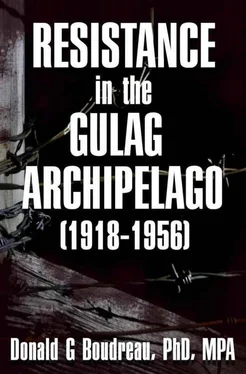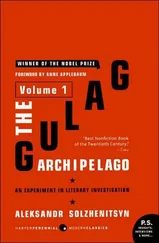The lieutenant colonel left Nerzhin waiting in the corridor of the Staff headquarters because in general Nerzhin was an insolent person (prisoner) always trying to find out what the law was. [26] Cf. Solzhenitsyn, “Circle”, at 179.
For the most part, resistance in the Mavrino Institute focused on psychological games that were being played out by the zek prisoners seeking concessions from the prison administration. Nerzhin is protesting vis-a-vis a way of thinking by not being carried away by the exalted Joseph Stalin. Nerzhin, a righteous individual, is accepting of the consequences inherent in his outlook.
…he [Gleb Nerzhin] clearly sensed the falsity in the exaggerated stifling exaltation of one man! If he was everything, did it not mean that other men were nothing. Out of pure protest Nerzhin refused to let himself be carried away. [27] Cf. Solzhenitsyn, “Circle”, at 235.
A constant theme throughout much of Solzhenitsyn’s work is the belief in the reemerging of the free man, who has been previously been denied of everything, that which gave him freedom. This belief undermines those who imprison, whether they be high or low.
Just understand one thing and pass it along to anyone at the top who still doesn’t know that you are strong only as long as you don’t deprive people of everything. For a person you’ve taken everything from is no longer in your power. He’s free all over again. [28] Cf. Solzhenitsyn, “Circle”, at 96.
This line of thought is dynamic for suddenly we are given to understanding that prison, terror, corruptibility, and sadism refine and purify the human ethos. It is not in the end the prisoners who are destroyed, even though they may lose their lives. It is the jailers Solzhenitsyn reminds us, the army of jailers which Stalin created and which flourished until, quite literally, one-third or one-half of Russia became a prison enterprise, run by prison engineers, directed by police generals, inhabited by police victims.
The problem of finding new cadres of prisoners to satisfy the inexorable needs of the system was tremendous. In the end, of course, the system devoured its creators. The doomed are the oppressors. Stalin is doomed. Beria is doomed. His lieutenant, Abakumov, is doomed. The prison chief, Lieutenant Colonel Klimentiev, is doomed. The system devours all of whom have been coopted by Stalin. The prisoners will endure in the end, if not found to have prevailed in a Faulknerian sense.
No… that’s not hell. That’s not hell at all! We are returning to hell. The sharashka is the highest, the best, the first circle of hell. It was almost paradise… yes the taiga and the tundra awaited them, the record cold of Omyakon and the copper excavations of Dzhez-Kazgan; pick and barrow; starvation rations of soggy bread; the hospital; death. The very worst. But there was a peace in their hearts. They were filled with the fearlessness of those who have lost everything, the fearlessness which is not easy to come by, but which endures. [29] Cf. Solzhenitsyn, “Circle”, at 673.
Cancer Ward is, in this writer’s opinion, Solzhenitsyn’s work of true genius on several levels. The story takes place in the cancer wing of a hospital in a city of one of the Soviet Asisatic republics. This novel, like The First Circle proceeds by episodes, many of which present sketches of the varieties of Soviet man. The least flattering of which is assigned to that of Rusanov, in civilian life a functionary in the record-keeping apparatus of the state; Rusanov’s records concern people, and accordingly bestow upon him the power to dispose of the lives of his fellow citizens.
In the name of the proletariat, he Rusanov tyrannizes over proletarians, questioning, imprisoning, exiling, searching out subversion and disaffection, inventing them at need-whether at the request of the government—or on his own account. Once in the cancer ward as a patient, however, he finds himself cutoff among sufferers who cancer has too afflicted to acknowledge his power, and physicians who, on their own ground, exercise even greater power, and in a better cause.
The most striking contrast to Rusanov is Oleg Kostoglotov, a former junior officer in the army who has been sentenced to forced labor for political disaffection, and later, to perpetual exile. Here we witness a clash between Kostaglotov and Rusanov.
“Well why do you swallow all this talk about social origin then. That’s not Marxism. It’s racism.” “What did you say?” shouted Rusanov, almost roaring with pain. “Exactly what you heard.” Kostoglotov threw the reply back at him. “Listen to this! Listen to this!” shouted Rusanov, staggering and waving his arms as if calling everyone in the ward to gather round him. “I call you as witnesses, I call you as witnesses! This is ideological; sabotage. Quickly Kostoglotov lowered his legs off the bed. Swinging both elbows, he made a highly indecent gesture at Rusanov, at the same time exploding with one of the filthiest words written up on walks: “Go and ____ yourself, you and your ideological sabotage! A fine habit you’ve developed, you mother…… Every time someone disagrees with you, you call it ideological sabotage!… Why do you keep cackling on about social origins like a witch doctor? You know what they used to say in the twenties? ‘Show us your calluses! Why are your hands so white and puffy?’ Now that was Marxism.” [30] Alexander I. Solzhenitsyn, Cancer Ward , (hereinafter “Cancer”), pp. 405-6.
Through Kostoglotov, Alexander Solzhenitsyn expresses his vehement disdain for the lack of respect for those who have gone to war out of patriotic reverence for Russia. This passage is indicative of Stalin’s blatant mistrust of Russian soldiers who were captured during the war and later returned as prisoners of war.
The novel Cancer Ward , however, takes place following Stalin’s death yet, as we continue witnessing Stalinist attitudes remaining pervasive post mortem .
Many of the cemeteries are shamefully neglected. I saw some in the Atlai Mountains and over toward Novosibirsk. There are no fences. The cattle wander into them, and pigs dig them up. Is that part of our national character? No, “we always used to respect graves…” “To revere graves”, Kostoglotov. [31] Cf. Solzhenitsyn, “Cancer”, at 138.
Alexander Solzhenitsyn also takes serious issue with the public fear in response to Stalin’s fanatical purging. It is not that the nation purchased Stalin’s demands wholesale, but rather, that they kept silent for they feared the loss of their own lives. To some extent, one cannot disregard this pregnant observation. Yet how far does it justify…
“What sort of man are we talking about?” he continued. “Suddenly all the professors and all the engineers turn out to be wreckers, and he believes it! The best Civil-War divisional commanders turn out to be German and Japanese spys, and he believes it! His own friends and acquaintances are unmasked as enemies of the people, and he believes it! Whole nations, old men and babies are mown down, and he believes it! Then what sort of man is he may I ask? He’s a fool. But can there really be a whole nation of fools? No, you’ll have to forgive me. The people are intelligent enough. It’s simply that they wanted to live. There’s a law big nations have-to endure and to survive. When each of us dies and History stands over and asks ‘What was he?’ there’ll be only one possible answer Pushkins: “In our vile times… man was, whatever his element, either tyrant or traitor or prisoner!” [32] Cf. Solzhenitsyn, “Cancer”, at 434.
Kostoglotov is one of those extraordinary persons who actually-learn from experience—that his, his reflections on his own history are original with him, and not derived from the recent opinions that constitute the body of social superstition at any time. He knows that his life of exile is a terrible injustice, that the Soviet state is a tyranny-the more shameful for its claim to incarnate a lofty ideal of political decency. Without for a moment hankering after the other social systems of which we have examples, he is shrewd enough to guess at the forms that injustice must assume in other states that claim to represent the popular will and the interests of the common man, he longs with an exile’s yearning for a community of fair dealing, of love and truth.
Читать дальше












